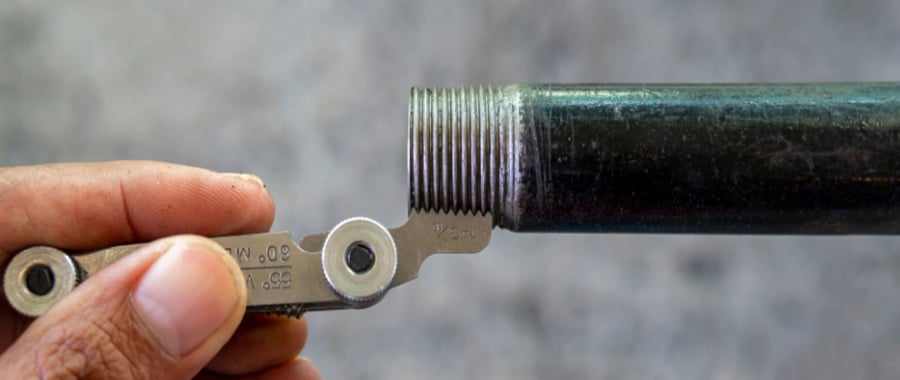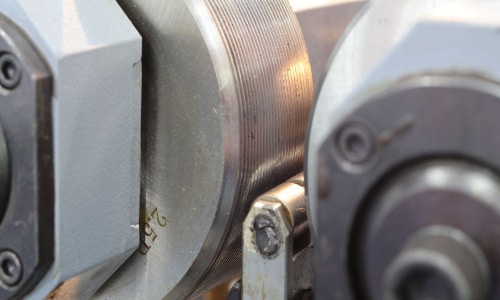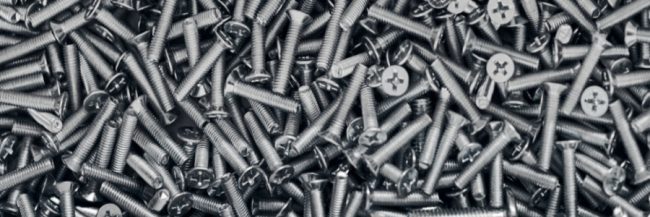
Rolled vs. Cut Threads – What’s the Difference?
You might intuitively understand that there are multiple ways to craft a screw or bolt. But have you ever considered the exact method for creating these essential fasteners? And have you ever wondered if one method is better than another?
You may have never even considered this question before, but perhaps you have a specific project that has forced you to wonder, “does it matter how the threads are made?”
Rolled Threads vs. Cut Threads
Threads in a screw or bolt must be consistent from top to bottom. When discussing rolled vs. cut threads, there’s not much difference from the perspective of the person using bolts and screws.
Strength-wise, they are very similar but there are other drastic differences in construction, costs, and finishing that may sway you towards rolled vs. cut threads or vice versa.

Rolled Threads: An Overview
A screw or bolt made with rolled threads starts life as a smooth round bar. It’s then forced through an extruder which forces the material into the familiar threaded screw or bolt we all recognize. Since no material is being removed, the final diameter of the threaded portion is actually larger than the original bar.
The valleys in between the threads equal the diameter of the smooth bar while the peaks stick out. This variability is an important area where rolling threads vs. cutting threads makes a difference for the user. For example, if you need a bolt or screw with threads and a body with the same diameter, rolled thread construction may not be what you want.
Rolling threads vs. cutting threads yields another interesting difference: thread strength. Rolled threads tend to be much sharper and better defined than cut threads thanks to the burnishing during manufacture, which improves fatigue resistance.
While it’s true that the screw or bolt body will be just as strong with either method, rolled threads tend to be stronger and more resistant to stripping than cut threads.
Pros and Cons of Rolled Threads
Benefits include:
- Less costly to make than cut thread bolts or screws
- A smaller diameter body means less weight
- No need to heat the material
- Smooth threads
The drawbacks are:
- There is a limit on the size of material, which limits the size of bolts and screws
- Material that is too hard can’t be rolled
- Thread diameter and body diameter are different
- Certain structural bolts can’t be rolled
Next, we’ll take a look at cut threads.
Cut Threads: An Overview
The main difference between rolling threads vs. cutting threads is that cut thread bolts and screws have the same body diameter as thread diameter. Cut threading takes a steel bar and cuts the threads into the material.
If you start with a 1-inch bar, your bolt or screw’s threads and body will still be 1 inch. Additionally, that bar can be just about any diameter or hardness.
When discussing the strength of rolled threads vs. cut threads, yes, the process of rolling yields stronger, smoother threads. But you can use much harder material with the cut thread method, and it can be bigger, too. Because thread cutting is a similar process to using a lathe, if the material can be spun, it can be threaded.
Pros and Cons of Cut Threads
Benefits of cut threads include:
- Practically any size bar and thread length are possible
- Threads can be cut to almost any pitch
- Works best with materials containing lead
The drawbacks include:
- They are more expensive to manufacture
- They are slower to produce
- They are heavier than rolled thread screws or bolts
- Threads can bind and fatigue
Keep these factors in mind when making your decision.

Which One Is Superior?
The question of superiority in the discussion over rolled vs. cut threads comes down to application and budget. If the threaded portion and the body don’t need to be the same diameter, the dimensions required are small, and the cost is a factor, then rolled threads are the better choice.
Cut threads are preferable for precision applications that need specific body and thread diameters, bolts or screws with large or unusual sizes, and when the cost is less of a concern.
Still Have Questions? Let us help!
You might still be wondering which method is best for your application. When in doubt, talk to our team.
At Crane Point Industrial, we’ve been supplying fasteners to hard-working construction, pallet, and industrial customers for over 25 years. So, we know a thing or two about selecting quality screws and bolts. In addition, our fastener supply company offers tools and equipment, construction accessories, industrial safety gear, pallet building supplies, and structural hardware.
Contact us today, and we’ll ensure you make the right choice.